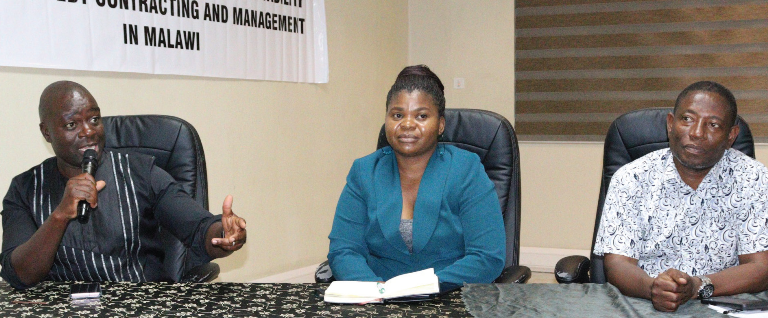Economists outline public debt impact
Economists say fiscal authorities have an opportunity to reduce the country’s public debt stock currently at unsustainable levels by cutting down on consumption, make meaningful investment in local production and broaden the tax base.
They said this on Wednesday in Blantyre during a public discussion on public debt titled ‘Fostering transparency and accountability in public debt contracting and management in Malawi’, organised by Malawi Economic Justice Network (Mejn).

Setting the ball rolling, Malawi University of Business and Applied Sciences associate professor of economics Betchani Tchereni argued that the country’s lifeline is not in the hands of international lenders, but locally through prioritisation of meaningful agriculture that goes beyond the traditional ways and making a reasonable investment in critical sectors.
He said for a start, from the savings that government has made on the austerity measures announced earlier this year, government should channel this towards establishing mega farms to maximise industrial production.
Said Tchereni: “Our lifeline is investment and production. The International Monetary Fund [IMF] is just there to simply assist us restructure debt.
“Locally, there are resources we can tap from, for instance, we could further cut on resources for senior government officials and some contractual agreements and use these to invest, thereby moving away from borrowing.”
He said while it is a fact that Malawi does not have resources handy, there is need to know that for a start, the kind of supplies needed for local production are not much.
“What we need now are machinery and raw materials. This and a relook on how we can broaden the tax base, we are good to go and can become a sovereign State,” he said.
Mejn executive director Bertha Phiri said the government is not doing well in debt contraction and management, observing that government is borrowing to consume and not invest, a development which is unsustainable.
She said: “Malawi has for so long depended on borrowing and this has only done more harm than good to the country. Meanwhile, we have been given the Rapid Credit Facility by the IMF, but this is one issue we should not celebrate because we cannot keep accumulating loans.
“What we need to do instead is to broaden the domestic tax base. We have the Domestic Resource Strategic Plan, but it seems we have done little to bring this into actualisation.”
Phiri said there are a lot of income generating and economic activities that go untaxed, adding that broadening the tax base is one way out of heavy borrowing.
Borrowing by a government is deemed to be sustainable when it is below 50 percent of the gross domestic product (GDP) broken down as domestic borrowing of not more than 20 percent of the GDP and external borrowing not exceeding 30 percent of GDP.
But Treasury figures indicate that total public debt stock was at K6.38 trillion as at June 2022 up from K5.8 trillion or 56.8 percent of the GDP recorded as at December 31 2021.
The country’s domestic debt on the other hand currently at K2.8 trillion, increased from 17.5 to 21.9 percent of GDP from 2019 to 2020, according to World Bank figures.
Minister of Finance and Economic Affairs Sosten Gwengwe is on record as having said that the government is looking at a domestic revenue mobilisation strategy to minimise borrowing by the Treasury both from local and external sources.






One Comment